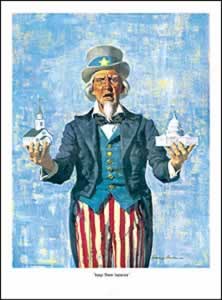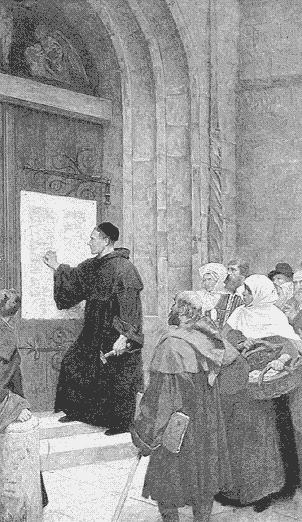No church within the limits of Romish jurisdiction was long left undisturbed in the enjoyment of freedom of conscience. No sooner had the papacy obtained power than she stretched out her arms to crush all that refused to acknowledge her sway, and one after another the churches submitted to her dominion.
PART ONE
But of those who resisted the encroachments of the papal power, the Waldenses stood foremost.
The faith which for centuries was held and taught by the Waldensian Christians was in marked contrast to the false doctrines put forth from Rome. Their religious belief was founded upon the written word of God, the true system of Christianity. But those humble peasants, in their obscure retreats, shut away from the world, and bound to daily toil among their flocks and their vineyards, had not by themselves arrived at the truth in opposition to the dogmas and heresies of the apostate church. Theirs was not a faith newly received. Their religious belief was their inheritance from their fathers. They contended for the faith of the apostolic church,--"the faith which was once delivered unto the saints." Jude 3. "The church in the wilderness," and not the proud hierarchy enthroned in the world's great capital, was the true church of Christ, the guardian of the treasures of truth which God has committed to His people to be given to the world. The Waldenses were among the first of the peoples of Europe to obtain a translation of the Holy Scriptures. Hundreds of years before the Reformation they possessed the Bible in manuscript in their native tongue. They had the truth unadulterated, and this rendered them the special objects of hatred and persecution. They declared the Church of Rome to be the apostate Babylon of the Apocalypse, and at the peril of their lives they stood up to resist her corruptions.
Behind the lofty bulwarks of the mountains--in all ages the refuge of the persecuted and oppressed--the Waldenses found a hiding place. Here the light of truth was kept burning amid the darkness of the Middle Ages. Here, for a thousand years, witnesses for the truth maintained the ancient faith.
PART TWO
God had provided for His people a sanctuary of awful grandeur, befitting the mighty truths committed to their trust. To those faithful exiles the mountains were an emblem of the immutable righteousness of Jehovah. They pointed their children to the heights towering above them in unchanging majesty, and spoke to them of Him with whom there is no variableness nor shadow of turning, whose word is as enduring as the everlasting hills. God had set fast the mountains and girded them with strength; no arm but that of Infinite Power could move them out of their place. In like manner He had established His law, the foundation of His government in heaven and upon earth. The arm of man might reach his fellow men and destroy their lives; but that arm could as readily uproot the mountains from their foundations, and hurl them into the sea, as it could change one precept of the law of Jehovah, or blot out one of His promises to those who do His will. In their fidelity to His law, God's servants should be as firm as the unchanging hills.
The mountains that girded their lowly valleys were a constant witness to God's creative power, and a never-failing assurance of His protecting care. Those pilgrims learned to love the silent symbols of Jehovah's presence. They indulged no repining because of the hardships of their lot; they were never lonely amid the mountain solitudes. They thanked God that He had provided for them an asylum from the wrath and cruelty of men. They rejoiced in their freedom to worship before Him. Often when pursued by their enemies, the strength of the hills proved a sure defense. From many a lofty cliff they chanted the praise of God, and the armies of Rome could not silence their songs of thanksgiving.
The very existence of this people, holding the faith of the ancient church, was a constant testimony to Rome's apostasy, and therefore excited the most bitter hatred and persecution. Their refusal to surrender the Scriptures was also an offense that Rome could not tolerate. She determined to blot them from the earth. Now began the most terrible crusades against God's people in their mountain homes. Inquisitors were put upon their track, and the scene of innocent Abel falling before the murderous Cain was often repeated.
Again and again were their fertile lands laid waste, their dwellings and chapels swept away, so that where once were flourishing fields and the homes of an innocent, industrious people, there remained only a desert. Many of these witnesses for a pure faith were pursued across the mountains and hunted down in the valleys where they were hidden, shut in by mighty forests and pinnacles of rock.
PART THREE
No charge could be brought against the moral character of this proscribed class. Even their enemies declared them to be a peaceable, quiet, pious people. Their grand offense was that they would not worship God according to the will of the pope. For this crime every humiliation, insult, and torture that men or devils could invent was heaped upon them.
The persecutions visited for many centuries upon this God-fearing people were endured by them with a patience and constancy that honored their Redeemer. Notwithstanding the crusades against them, and the inhuman butchery to which they were subjected, they continued to send out their missionaries to scatter the precious truth. They were hunted to death; yet their blood watered the seed sown, and it failed not of yielding fruit. Thus the Waldenses witnessed for God centuries before the birth of Luther. Scattered over many lands, they planted the seeds of the Reformation that began in the time of Wycliffe, grew broad and deep in the days of Luther, and is to be carried forward to the close of time by those who also are willing to suffer all things for "the word of God, and for the testimony of Jesus Christ." Revelation 1:9. - Excerpts GC 61-78.
















0 comments:
Post a Comment